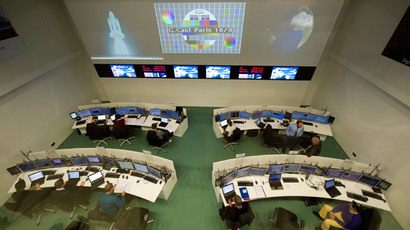Russian sanctions, NSA spying top the agenda at Merkel’s White House visit
Germany’s Chancellor Merkel is in the White House for the first time since it was revealed the NSA monitored her personal communications. During bilateral talks with Barack Obama, Merkel is expected to broach sanctions on Russia and US spying.
Relations between Washington and Berlin are showing signs of tensions, as German companies call for a halt to sanctions on Russia. Furthermore, Germany is still reeling from the NSA spy revelations that affected millions of German citizens, as well as high-ranking businessmen and politicians.
Merkel reiterated earlier this week that Germany would support any further financial sanctions against Russia. However, growing calls from the German business sector may force her to change her policy in Friday’s meeting.
“The Germans are very clear they are not going to pursue factions that hurt German industry. That would be the straw that broke the camel’s back,” said Michael Hudson professor of Economics at the University of Missouri to RT.
Indeed, some major corporate figures have already spoken out against a potential escalation of the sanctions, maintaining they will do more harm than good to the German economy.
“If there's a single message we have as business leaders, then it's this: sit down at the negotiating table and resolve these matters peacefully,” Eckhard Cordes told a recent conference in Berlin. Cordes is a former Daimler AG executive who now heads the Ostauschuss, German industry's branch for Eastern Europe, reported the Wall Street Journal.
So far the US, EU, Canada and Japan have imposed sanction on Russia for its alleged role in the unrest in eastern Ukraine. Moscow has denied claims it is involved in the unrest and has pointed the finger at Washington for orchestrating the situation in Ukraine as part of its geopolitical strategy in the region.
NSA spying
The espionage antics of the US National Security Agency remain a bone of contention between Berlin and Washington. It emerged earlier in April that Merkel had been denied access to her NSA file, following reports the agency had monitored her personal communications. The revelations had a profound effect on German society, prompting calls for Washington to account for its actions.
“First the US denied spying on Merkel’s cell phone, then admitted it, now it just continues, because Obama says ‘we reserve the right to collect information.’ I just see Angela Merkel going to the US to pick up new instructions,” Ken Jebson, Redaktion radio host told RT’s Peter Oliver.
While WikiLeaks spokesperson Kristinn Hrafsson, said the German government’s lack of resolve over the NSA spy scandal is indicative of European cowardice in the face of US dominance.
“I think the proof of the cowardice of governments and politicians and their unwillingness to tackle this in a meaningful way, despite what they say publicly, was when European countries closed their airspace and forced the presidential plane of Evo Morales to land in Austria, on a hunch that Edward Snowden was on board,” he told RT.
Earlier this year Washington pledged that it would no longer spy on world leaders, but stated it would still gather information on the intentions of foreign powers through its espionage programs.














